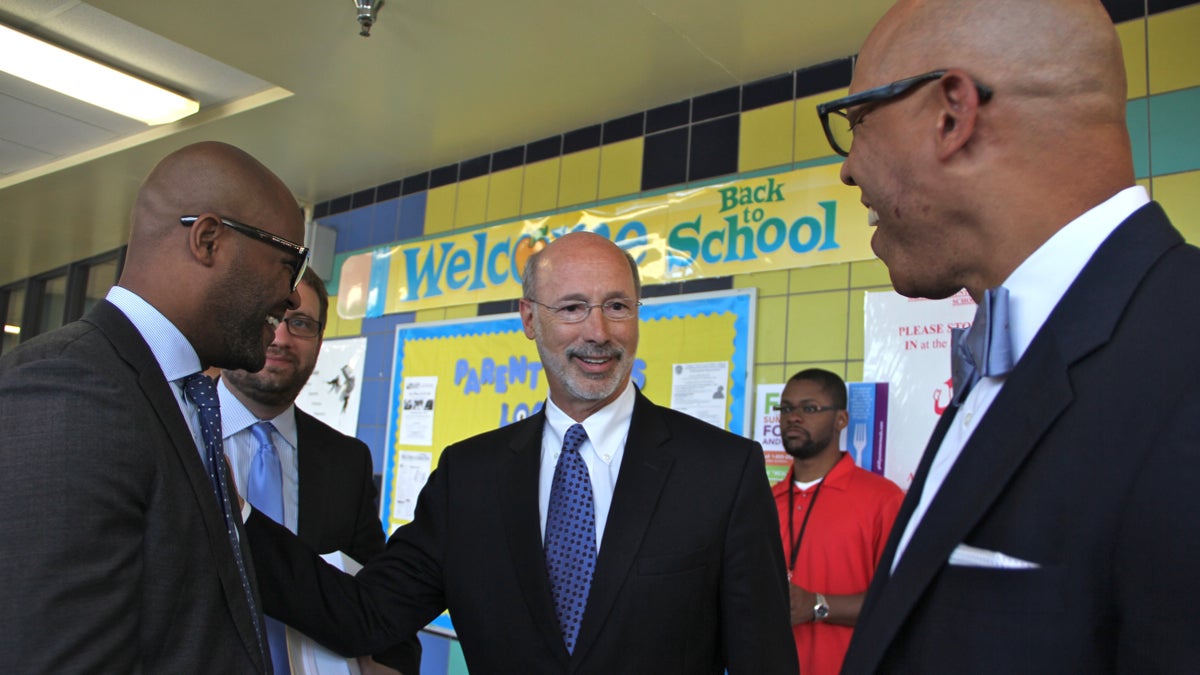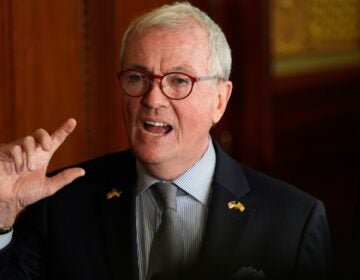Wolf’s half-year school spending plan begins to restore cuts to Philadelphia

Gov. Tom Wolf, center, visits William H. Hunter School in North Philadelphia in 2015. (Emma Lee/WHYY)
In the first 15 years of charter schools in Pennsylvania, the state acknowledged the alternatives to traditional public schools pose a financial burden for school districts.
During former Gov. Tom Corbett’s first year in office, the aid to cover those added costs was eliminated – wreaking havoc on districts with many charters, namely Philadelphia.
Corbett’s successor, Gov. Tom Wolf, took steps this week to change that.
As the larger budget battle continues in the state Capitol, Wolf has agreed to release half a year’s worth of state aid to schools.
Within that allocation, Wolf has partially brought back the charter reimbursement funding that was cut in 2011.
Statewide, $2.8 billion has been released. The School District of Philadelphia has received $518 million – representing 45 percent of its projected basic education funding for the year and doubling last year’s “Ready to Learn” block grant funds.
With the rationale that districts disproportionately hurt by cuts need to be made whole, Wolf steered an additional $28.3 million to Philadelphia through the block grant as charter reimbursement cash, bringing its total allotment to $62 million.
“We need to restore the severe cuts that were enacted under the previous governor and Republican-controlled legislature,” said Wolf’s spokesman Jeffrey Sheridan.
Some Republicans have criticized Wolf for unfairly favoring the state’s largest city.
“The guy lives in Philadelphia, so he brought the money home,” said Steve Miskin, spokesman for House Republican leadership. “He wants to disproportionately take money from other areas and bring it to Philadelphia without any controls or accountability.”
Wolf owns homes in both York County and Philadelphia.
Miskin said his caucus sympathizes with the damage inflicted upon the school district because of lost charter reimbursement funds. He said members, though, have been put off by a few of City Council’s moves, including refusing to hold a hearing on former Mayor Michael Nutter’s plan to sell the Philadelphia Gas Works.
“Philadelphia doesn’t seem to want to help itself,” said Miskin.
As state revenues have decreased in recent years, Philadelphia’s local government has consistently generated additional support for schools – passing a series of property tax increases, a sales tax increase and an additional levy on cigarettes.
Framework?
Rank and file members of the Legislature haven’t returned to the Capitol following the holidays – evidencing little signs of urgency to resurrect the larger “framework” budget agreement.
That compromise, endorsed by leaders, would have provided a historic $400 million K-12 public education funding boost, enacted state employee pension reform to reduce the share of market risk on taxpayers, and allowed wine to be sold in supermarkets.
It fell to pieces when leaders in the House couldn’t corral enough votes for passage.
The Wolf administration believes a deal can still be reached. Using his veto power, Wolf slashed funding for line-items such as agricultural support in an attempt to pressure rural Republicans to back a larger pact.
Miskin doesn’t believe that strategy will work.
“Our members may be able to live with some of those cuts,” he said.
With last year’s budget still unresolved, Wolf will lay out his vision for this year’s budget on Feb. 9.
Philadelphia’s new mayor, Jim Kenney, hopes Wolf will achieve his goals.
At an event this week, he attributed the protracted budget battle, in part, to his belief that many state lawmakers don’t understand the nature and depth of the challenges faced by urban public schools.
Kenney has pledged to visit a Philadelphia public school each week of his tenure, and says he can help break the logjam in the Capitol by inviting Republican leaders to join him.
“I would love to see a number of our leadership in Harrisburg come down, without the press, and just go with me … go into these schools and see these teachers and talk to these kids and see what potential is there,” said Kenney. Republican leaders are “human beings. They’re decent people, and I think they’ll understand that.”
Miskin said House Majority Leader Dave Reed has talked with Superintendent William Hite about touring district schools.
WHYY is your source for fact-based, in-depth journalism and information. As a nonprofit organization, we rely on financial support from readers like you. Please give today.





